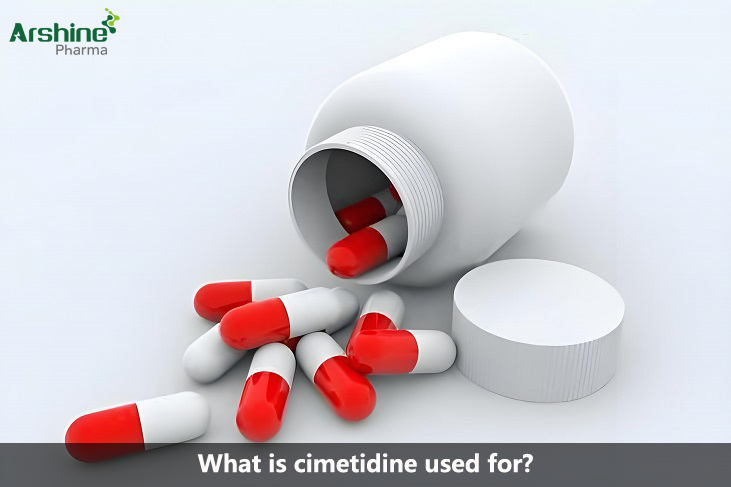
Cimetidine usually refers to Cimetidine tablets. The efficacy of Cimetidine tablets mainly includes inhibiting gastric acid secretion, protecting gastric mucosa, relieving stomach pain, treating peptic ulcers, treating reflux esophagitis, etc. Patients need to use medication reasonably under the guidance of a doctor.
1. Inhibiting gastric acid secretion
Cimetidine tablets are a type of medication that inhibits gastric acid secretion. Patients taking this medication under the guidance of a doctor can inhibit gastric acid secretion, reduce damage to the gastric mucosa, and avoid symptoms such as acid reflux and belching.
2. Protecting the gastric mucosa
Cimetidine tablets can protect the gastric mucosa, reduce the stimulation of gastric acid on the gastric mucosa, and thus alleviate the symptoms of stomach pain. They also have a certain therapeutic effect on the above symptoms caused by diseases such as peptic ulcers and reflux esophagitis.
3. Relieve stomach pain
If there is stomach pain, patients can follow the doctor's advice to use this medication for treatment, in order to achieve the goal of relieving pain.
4. Treating peptic ulcers
Peptic ulcer usually refers to an ulcer caused by the self digestion of the gastrointestinal mucosa by gastric acid or pepsin, which may be related to factors such as Helicobacter pylori infection. Patients generally experience discomfort symptoms such as stomach pain and bloating. Patients can follow the doctor's advice to use cimetidine tablets for treatment, thereby inhibiting gastric acid secretion and improving the condition.
5. Treatment of reflux esophagitis
Reflux esophagitis usually refers to a disease in which the contents of the stomach and duodenum reflux into the esophagus, causing esophageal mucosal erosion and ulcers. It may be related to factors such as impaired anti reflux function and structure, reduced esophageal clearance ability, etc. Patients may experience symptoms such as stomach pain and belching. Patients can follow the doctor's advice to use cimetidine tablets for treatment, thereby reducing gastric acid secretion and relieving discomfort symptoms.
Is cimetidine an h1 or H2 blocker?
Cimetidine, also known as cimetidine preparations, is not an H1 receptor blocker but an H2 receptor antagonist. Cimetidine preparations are commonly used in clinical practice as acid suppressants to inhibit gastric acid secretion. They can be used for conditions such as gastritis, gastric ulcers, and duodenal ulcers.
As an H2 receptor antagonist, cimetidine preparations can selectively block the H2 receptors on gastric parietal cells, thereby inhibiting the secretion of histamine. This further inhibits the function of gastric parietal cells in secreting gastric acid, achieving the effect of reducing the acidity of the stomach contents. The occurrence of gastric diseases such as gastritis and peptic ulcers is often considered to be related to the excessive secretion of gastric acid, which stimulates the gastric mucosa. In such cases, cimetidine preparations such as cimetidine capsules and cimetidine tablets can be used to help suppress gastric acid secretion, thereby providing therapeutic effects for these conditions.
Clinically, H1 receptor blockers are also known as antihistamines and generally have certain anti-allergic effects. Common H1 receptor blockers include chlorpheniramine maleate tablets, cyproheptadine hydrochloride tablets, cetirizine hydrochloride tablets, loratadine tablets, and desloratadine tablets. H1 receptor blockers are mainly used to treat allergic diseases such as allergic rhinitis, allergic urticaria, and allergic asthma. Their function differs from that of H2 receptor antagonists like cimetidine preparations.
What to avoid when taking cimetidine?
- Diet
Cimetidine tablets are H2 receptor blockers mainly used to treat peptic ulcers, reflux esophagitis, and other related conditions. During the medication period, patients should avoid spicy and irritating foods such as chili peppers and Sichuan peppercorns, as these can irritate the gastrointestinal tract and affect the drug's therapeutic effect. Additionally, patients should avoid consuming excessively greasy foods like fried chicken and roasted meats to prevent overloading the gastrointestinal tract, which could interfere with drug absorption.
- Drug Contraindications
Patients allergic to cimetidine tablets should avoid taking the medication to prevent allergic reactions, such as rashes and itching. Pregnant and breastfeeding women should also avoid using cimetidine tablets to prevent potential impacts on fetal development and normal milk secretion.
- Medication Precautions
While taking this medication, patients should avoid taking it simultaneously with other drugs to prevent drug interactions that could affect its therapeutic effect. If patients need to take other medications concurrently, they should consult a doctor to avoid drug interactions that could impair the drug's effectiveness.
- Allergic Reactions
Patients with an allergic constitution who are allergic to cimetidine tablets may experience allergic reactions such as skin itching and swelling after taking the medication. In severe cases, anaphylactic shock may occur. It is recommended that patients immediately stop taking cimetidine tablets and seek medical attention. Under a doctor's guidance, they can use antihistamines like loratadine and cetirizine hydrochloride to treat the allergy.
- Other Precautions
During the medication period, patients should also avoid smoking and drinking alcohol to prevent gastrointestinal irritation and ensure optimal drug absorption. Additionally, patients should avoid strenuous exercise to prevent damage to the gastrointestinal mucosa, which could affect the drug's therapeutic effect.
